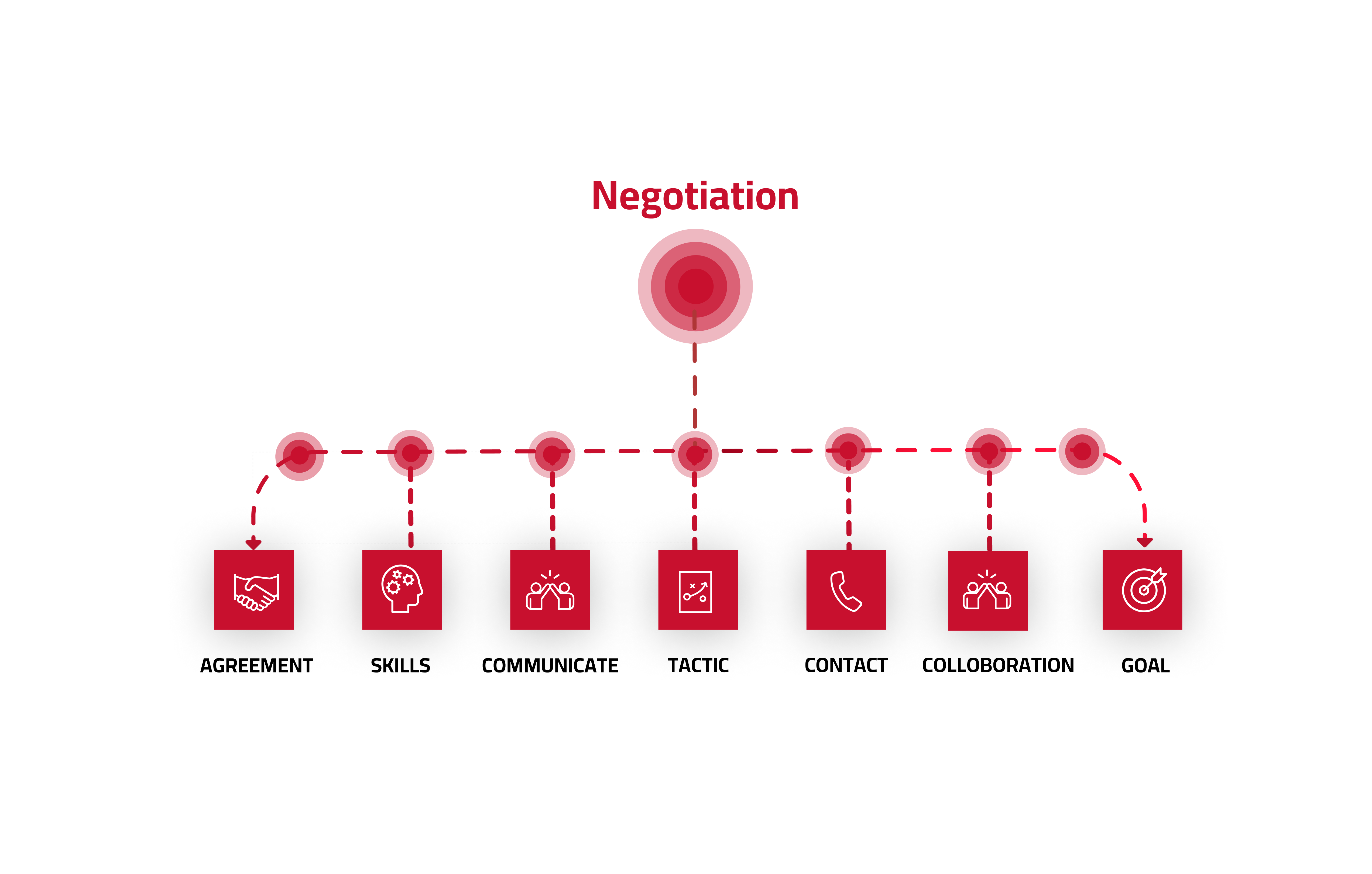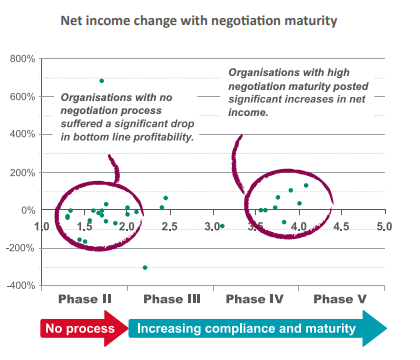What does negotiate mean?
There’s often confusion around the definition of negotiation in a business setting.
Negotiation in business refers to individuals or organisations engaging in discussion, either in-person or virtually, to reach agreements or resolve conflicts. Negotiation involves the exchange of proposals, interests, and counteroffers with the goal of achieving favourable outcomes for all parties involved.
Most people regard negotiation as a business task primarily undertaken by professional buyers and salespeople. In this context, negotiation often revolves around topics such as contracts, partnerships, pricing, terms, or resolving disputes.
What are important negotiation skills in business?

In business negotiation skills such as active listening, effective communication, problem solving, and the ability to find mutually beneficial solutions are required. It plays a crucial role in fostering collaboration, building relationships, and maximising value for all stakeholders.
However, our global negotiation research survey revealed the most common type of negotiation that happens in the workplace isn’t commercial at all. Over half (65%) of our respondents indicated they frequently participated in non-commercial negotiations.
You’re likely to spend more time utilising negotiation skills than you realise, so understanding the fundamentals of negotiation and building these skills will help you succeed in both a commercial and non-commercial role.
When we’re looking at negotiation through a commercial lens, we define it as the process by which sellers and buyers agree on the terms and conditions on which they are going to do business once a sale has been approved.
Three conditions have to exist for negotiation to take place:
-
The resource is scarce; if not, there's no point in negotiating
-
Both sides are able to vary the terms
-
Agreement and conflict exist; if there's agreement then there's no point in negotiating, and if both sides are in total agreement then there’s nothing to negotiate
Why are negotiation skills important in business?
Post-pandemic, negotiation skills became, and still remain, the most important tool to drive business success at crucial points of the decision-making cycle.
According to our research, 90% of business leaders believe communication skills, like negotiation, are vital for the future of their business. But, despite this, just 15% of employers feel their teams are experienced enough in communications to maintain business growth in a post-COVID market.
Unsurprisingly, 80% of business leaders surveyed feel their teams would benefit from training to improve their company growth.
The model in our report describes the different stages of negotiation maturity as organisations go from an ad hoc approach to world-class – with organisation-wide compliance in the negotiation process.
Through this model, we uncovered that during 2022, the net income of the Global 2000 declined by 30.9%.
In that same period, the upper quartile of companies on our ‘negotiation maturity’ benchmarking scale posted an average net income increase of 42.5%.
This serves as conclusive proof that negotiation skills have a direct correlation with revenue increases.
Learn how to measure negotiation success. Get your copy of our research report Negotiation performance—the key to long term business growth’.
Does a formal negotiation process add value?
We have many anecdotal stories that prove a formal negotiation process adds value, however, the one true measure of success is bottom-line profitability.
Using the OneSource online database, our research team pulled out net income data from two, annual reports for over 4,000 participants. They then calculated the % change in net income and ranked the companies in order of income gain – so the most successful was at the top of the scale.
When the net income change was plotted against the negotiation maturity ranking, it revealed two outcomes.
-
The organisations with no negotiation process suffered a significant drop in annual profitability
-
Organisations with high negotiation maturity and well-developed negotiation skills saw a significant increase in net income.

Aside from profitability, adding a formal negotiation process can empower your employees, helping them learn new skills they’ll utilise in all aspects of their careers.
Take a look at this case study from John Hogg:
This highly specialised and qualified team needed to strengthen their commercial skills across the board to drive growth.
They wanted to trust in negotiation methodologies that offered exceptional new negotiation skills and rigorous processes that met the expectations of their academic/research-focused backgrounds.
Here are the results:
“One of the key negotiation skills the training has given me is an understanding of what behaviours the other side is using and knowing how to respond to our advantage, while still maintaining a positive overall relationship. There isn’t a day goes by that I don’t use the skills taught in the Complex Negotiations programme – a few things I already did before, but now I can properly structure and plan my responses with confidence!” — Liz Taylor, Buyer
Effective negotiation can equate to millions in bottom line profits, and many companies have embarked upon large-scale training programmes – but without a clear strategy behind the initiative, they become an exercise in ticking boxes.
How to become a great negotiator
According to our CEO, Tony Hughes, in our whitepaper, 'Developing successful negotiation skills’
“…skilled negotiators do more planning than average ones.”
The major differences are really around the behavioural skills of skilled negotiators, in that they have behavioural flexibility.
The way they speak to people is flexible. They plan how they want to speak to people. They plan the intonation, shall we say, of the negotiation, there's so much work that goes into that.
When we were looking at the research, the biggest differences we found, were in those behavioural skills that people use and certain behaviours being used more than other behaviours.
In the whitepaper, we defined what constitutes a skilled negotiator, based on three criteria:
1. They should be rated as effective by both sides
Both sides should agree the negotiator is effective to avoid a biased, single-frame-of-reference.
2. They should have a track record of significant success
The criterion for choosing an effective negotiator was a consistent track record of success over a specified period of time.
3. They should have a low incidence of implementation failures
In addition to a track record of agreements, the record of implementation was also studied to ensure the agreements reached were successfully carried out.
Skilled negotiators are seekers.
They seek motivations and feelings from the other side to test the temperature of the negotiation and whether things are on the right track.
Skilled negotiators also ask for clarification—they test to make sure they have a firm understanding of what was said and to make sure the other side understands when they are summarising it back.
How to counter hard negotiation skills
Learn how to improve your negotiation performance. Download our report and discover why negotiation skills are essential to long-term growth.
How to measure negotiation success
According to our research, 84% of organisations have no formalised measurement of negotiation success beyond the contract signature.
Assessing the effectiveness of negotiations is a process that shouldn’t have an expiry date.
To provide a framework for retaining successful relationships and mutual value, the effectiveness of negotiations must be measured beyond the deal.
We conducted an interview with a director of global contracts in a Global 500 company, in the Research report - ‘Negotiation performance – the key to business success’ who developed a successful, long-term measurement framework.
“We certainly compare the results of the negotiation with the plan, the charter – the objectives that we set out to accomplish initially – but it doesn’t end there.”
“I have a portfolio of contracts that I’m constantly measuring and monitoring and making sure that 12 months, 18 months, 24 months after we’ve signed the paper, am I still delivering the benefits from the contract that I negotiated up-front when I signed the deal?”
Their organisation has developed a negotiation performance dashboard, which is presented to the CFO at quarterly meetings.
In terms of metrics, the director of contracts explains: “We have developed common metrics that cut across all the agreements, and we have specific metrics that are unique to a particular contract. Is it financial in nature? Is the cost in line with what I anticipated it to be?
What is the service delivery, in terms of SLAs (Service Level Agreements)? There are also vital signs that we’ve crafted around the health of the agreement: the turnover ratios of employees, the sustained costs of applications versus the number of employees. I like to describe the vital signs as the health of that contract. The health of the patient”.
The essential ingredients for negotiating
When Huthwaite International launched its biggest ever global survey into the tactics and behaviours that people deem effective at the negotiating table, we identified four essential ingredients for a successful negotiation:
1. Power
How powerful you feel at the table will have a direct impact on what you ultimately achieve. The more powerful you feel, the more powerful you behave.
2. Strategies and Tactics
Having a clear understanding of what you want to get out of the negotiation and how you’re going to achieve your objectives is crucial.
3. Preparation and Planning
Huthwaite's research found that skilled negotiators focus more on planning (deciding what to do with the data) rather than on preparation (the process of collecting data).
4. Behavioural skills
This relates to behavioural skills like persuasion. Testing understanding and giving feelings. It also pertains to the negative behaviours that could potentially upset the other party.
Average negotiators, on the other hand, were experienced negotiators with a moderate track record of success. By directly observing these negotiations, we were able to analyse the behavioural differences between the two groups and differences in the strategies and tactics they used.
How to improve negotiation skills
Having conducted the largest body of directly observed research into live commercial and contract negotiations, we’ve uncovered a number of tips from experts in the field of negotiation. From countering hard bargaining tactics to opening negotiations.
Barney Jordaan, Professor of Negotiation and Dispute Resolution at Vlerick Business School, interviewed Huthwaite International’s CEO Tony Hughes to uncover four tips for negotiating better.
Including key preparation questions to ask, such as:
-
What information do you want to give?
-
What messages do you want to send?
-
What information do you not want to give?
-
What information do you need?
Without negotiation skills, even if you know you’re facing a scheduled negotiation, you don’t always know how to plan to get what you want.
Learning an effective process for robust and reliable preparation and planning is invaluable and can be taught in an engaging, insightful course, tailored to your specific needs.
Negotiation training
Honing your negotiation skills as part of a wider strategy is as much about looking at failure as it is about focusing on success.
Much of the research Huthwaite International has carried out focuses on a single question: what do people do when they are being successful that they don't do when they are not successful?
We’ve researched the answer to this question for over five decades.
Our unique research involved observation of the live execution of business negotiations, which revealed exactly what successful negotiators do. This resulted in the measurable, trainable and repeatable behavioural patterns used in our negotiation skills training.
-
Nine behaviours identified as statistically significant to negotiation success
-
Behaviours applicable for those procuring or selling
-
Initial research –was published in the Journal of Industrial Training
-
Validation includes the observation of over 10,000 live practice negotiations in the last 10 years.
Most training companies provide processes and tools, but no one else comes close to having the proven and robust verbal behaviour models we share with our clients.
We’ve trained some of the world's top negotiators – they prefer to stay anonymous, so their skills are a powerful advantage their opponents don’t see coming.
It’s not uncommon for the investment in a Huthwaite negotiation programme to be returned (and more) in the very next deal.
The gains and savings our clients around the world have made run into millions.
We helped one global energy supplier save £37 million in a single negotiation.

Discover the key to long-term business growth.
How to measure your negotiation success
how to benchmark your negotiation processes
how businesses can collaborate to reduce negotiation cycle time.




.webp)


